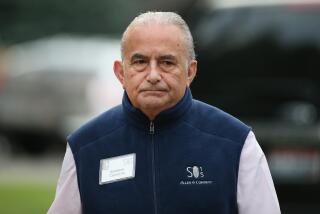Legal Point May Decide Fate of Cisneros Probe
- Share via
WASHINGTON — Sources familiar with the case say that Atty. Gen. Janet Reno’s decision on whether to seek an independent counsel to investigate Housing and Urban Development Secretary Henry G. Cisneros hinges primarily on a legal question: What role did his allegedly misleading statements play in his appointment?
Cisneros has been under FBI scrutiny since last fall for allegedly having made false statements to agents who reviewed his background before his selection by President Clinton to head the Department of Housing and Urban Development.
However, sources said, officials may determine that Cisneros’ inaccurate statements about his payments to a former mistress may not be “material,” or influential, in the decision to elevate him to the Cabinet. If that is so, the statements would not trigger a full-blown criminal investigation.
Cisneros, a former mayor of San Antonio, acknowledged to FBI agents in late 1992 and early 1993 that he had made secret payments to Linda Medlar after he reconciled with his wife following a much publicized affair. But Cisneros placed the amount at only a fraction of the $150,000 to $200,000 that he actually paid Medlar, and he insisted that the transactions had ended by late 1992--when the payments actually were continuing.
Legal precedents under study by Justice Department lawyers suggest that Cisneros’ statements, while false, may not have been material--meaning that they did not have a substantial influence on his appointment and subsequent confirmation by the Senate.
For example, a decision last year on the issue of materiality by the U.S. 5th Circuit Court of Appeals reversed the conviction of a Baton Rouge, La., attorney who had been found guilty of submitting false statements to a federally insured bank. The court ruled that while the statements of the lawyer, Lynn Williams, were technically false, they dealt with such minor matters as his title in a small company.
According to the judges, the false assertions had no bearing on the bank’s approval of a loan to two associates of Williams who were convicted on other felonies.
“We hold that these statements were not capable of influencing the bank’s decision one way or the other and, as such, fail to meet the materiality requirement,” the court ruled.
Cisneros, in telephone conversations that Medlar secretly recorded, appeared to believe that the full story of his substantial payments to her could greatly harm his chances of becoming HUD secretary.
“The only person in the world who can sink me . . . is you,” he told Medlar at one point, apparently referring to his effort to understate the payments during talks with the FBI. Medlar has turned over copies of the tapes to the Justice Department.
A government source said Cisneros’ statements must meet “an objective standard of materiality,” even though Cisneros may have regarded them as important.
*
A federal manual followed by all U.S. attorneys also states that for a false statement to pass muster, it must be shown to have had “probative weight” or to have influenced the outcome of an event.
Originally Reno was scheduled to decide on Jan. 13, following a 90-day preliminary inquiry by the Justice Department, whether she would ask a panel of federal appellate judges to appoint an independent counsel in the matter. But she was granted an additional two months--until Monday--to resolve the issue, without giving a specific reason.
Times researcher Pat Welch contributed to this story.
More to Read
Sign up for Essential California
The most important California stories and recommendations in your inbox every morning.
You may occasionally receive promotional content from the Los Angeles Times.










